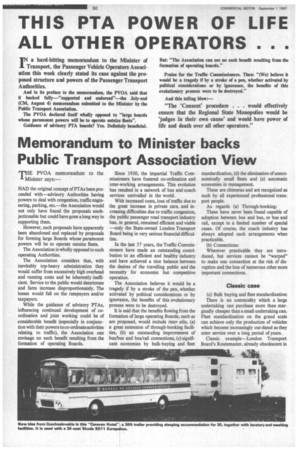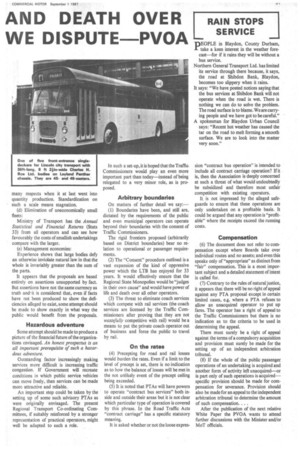Memorandum to Minister backs Public Transport Association View
Page 52

Page 53

If you've noticed an error in this article please click here to report it so we can fix it.
'THE PVOA memorandum to the -IMinister says:—
HAD the original concept of PTAs been proceeded with—advisory Authorities having powers to deal with congestion, traffic engineering, parking, etc.—the Association would not only have found the proposals unobjectionable but could have gone a long way in supporting them.
However, such proposals have apparently been abandoned and replaced by proposals for forming large Boards whose paramount powers will be to operate outsize fleets.
The Association is wholly opposed to such operating Authorities.
The Association considers that, with inevitably top-heavy administration they would suffer from excessively high overhead and running costs and be inherently inefficient. Service to the public would deteriorate and fares increase disproportionately. The losses would fall on the ratepayers and/or taxpayers.
While the guidance of advisory PTAs, influencing continued development of coordination and joint working could be of considerable benefit (especially in conjunction with their powers to co-ordinate activities relating to traffic), the Association can envisage no such benefit resulting from the formation of operating Boards. Since 1930, the impartial Traffic Commissioners have fostered co-ordination and inter-working arrangements. This evolution has resulted in a network of bus and coach services unrivalled in the world.
With increased costs, loss of traffic due to the great increase in private cars, and increasing difficulties due to traffic congestion, the public passenger road transport industry has, in general, remained efficient and viable —only the State-owned London Transport Board being in very serious financial difficulties.
In the last 37 years, the Traffic Commissioners have made an outstanding contribution to an efficient and healthy industry and have achieved a nice balance between the desires of the travelling public and the necessity for economic but competitive operation.
The Association believes it would be a tragedy if by a stroke of the pen, whether activated by political considerations or by ignorance, the benefits of this evolutionary process were to be destroyed.
It is said that the benefits flowing from the formation of large operating Boards, such as are proposed, would include inter alia, (a) a great extension of through-booking facilities, (b) an outstanding improvement of bus/bus and bus/rail connections, (c) significant economies by bulk-buying and fleet
standardization, (d) the elimination of uneconomically small fleets and (e) automatic economies in management.
These are chimeras and are recognized as such by all experienced professional transport people.
As regards (a) Through-booking: These have never been found capable of adoption between bus and bus, or bus and rail, except in a limited number of special cases. Of course, the coach industry has always adopted such arrangements when practicable.
(b) Connections: Wherever practicable they are introduced, but services cannot be "warped" to make one connection at the risk of disruption and the loss of numerous other more important connections.
Classic case
(c) Bulk buying and fleet standardization: There is no commodity which a large undertaking can purchase more than marginally cheaper than a small undertaking can. Fleet standardization on the grand scale can achieve only the production of vehicles which become increasingly out-dated as they enter service over a long period of years.
Classic example—London Transport Board's Routemaster, already obsolescent in many respects when it at last went into quantity production. Standardization on such a scale means stagnation.
(d) Elimination of uneconomically small fleets:
Ministry of Transport has the Annual Statistical and Financial Returns (Stats 33) from all operators and can see how favourably the costs of smallish undertakings compare with the larger.
(e) Management economies: Experience shows that large bodies defy an otherwise inviolate natural law in that the whole is invariably greater than the sum of the parts.
It appears that the proposals are based entirely on assertions unsupported by fact. But assertions have not the same currency as truth and.it is considered that, even if facts have not been produced to show the deficiencies alleged to exist, some attempt should be made to show exactly in what way the public would benefit from the proposals.
Hazardous adventure Some attempt should be made to produce a picture of the financial future of the organizations envisaged. An honest prospectus is an all important prerequisite of such a hazardous adventure.
Outstanding factor increasingly making services more difficult is increasing traffic congestion. If Government will recreate conditions in which public service vehicles can move freely, then services can be made more attractive and reliable.
An important step could be taken by the setting up of some such advisory PTAs as were originally envisaged. The present Regional Transport Co-ordinating Committees, if suitably reinforced by a stronger representation of practical operators, might well be adapted to such a role. In such a set-up, it is hoped that the Traffic_ Commissioners would play an even more important part than today—instead of being relegated to a very minor role, as is proposed.
Arbitrary boundaries On matters of further detail we say:—
(1) Boundaries have been, and still are, dictated by the requirements of the public and even municipal operators can operate beyond their boundaries with the consent of Traffic Commissioners.
The rigid frontiers proposed (arbitrarily based on District boundaries) bear no relation to operational or passenger requirements.
(2) The "Consent" procedure outlined is a vast expansion of the kind of oppressive power which the LTB has enjoyed for 33 years. It would effectively ensure that the Regional State Monopolies would be "judges in their own cause" and would have power of life and death over all other operators.
(3) The threat to eliminate coach services which compete with rail services (the coach services are licensed by the Traffic Commissioners after proving that they are not wastefully competitive with rail) would be a means to put the private coach operator out of business and force the public to travel by rail.
On the rates (4) Precepting for road and rail losses would burden the rates. Even if a limit to the level of precept is set, there is no indication as to how the balance of losses will be met in the not unlikely event of the precept ceiling being exceeded.
(5) It is noted that PTAs will have powers to operate "contract bus services" both inside and outside their areas but it is not clear which particular type of operation is covered by this phrase. In the Road Traffic Acts "contract carriage" has a specific statutory meaning.
It is asked whether or not thelooseexpres
sion "contract bus operation" is intended to include all contract carriage operation? If it is, then the Association is deeply concerned at such a threat of what would undoubtedly be subsidized and therefore most unfair competition with existing operators.
It is not impressed by the alleged safeguards to ensure that these operations are only undertaken on a profitable basis. It could be argued that any operation is "profitable" where the receipts exceed the running costs.
Compensation (6) The document does not refer to compensation except where Boards take over individual routes and no assets; and even this speaks only of "appropriate" as distinct from "fair" compensation. This is a most important subject and a detailed statement of intent is called for.
(7) Contrary to the rules of natural justice, it appears that there will be no right of appeal against any PTA proposal except in certain limited cases, e.g. where a PTA refuses to allow an unacquired operator to put up fares. The operator has a right of appeal to the Traffic Commissioners but there is no indication as to the criteria to be used in determining the appeal.
There must surely he a right of appeal against the terms of a compulsory acquisition and provision must surely be made for the setting up of an independent arbitration tribunal.
(8) If the whole of the public passenger operations of an undertaking is acquired and another form of activity left unacquired—or is part only of such operations is acquired— specific provision should be made for compensation for severance. Provision should also be made for an appeal to the independent arbitration tribunal to determine the amount of such compensation.. .
After the publication of the next relative White Paper the 131/0A wants to attend further discussions with the Minister and/or MoT officials.












































































































































